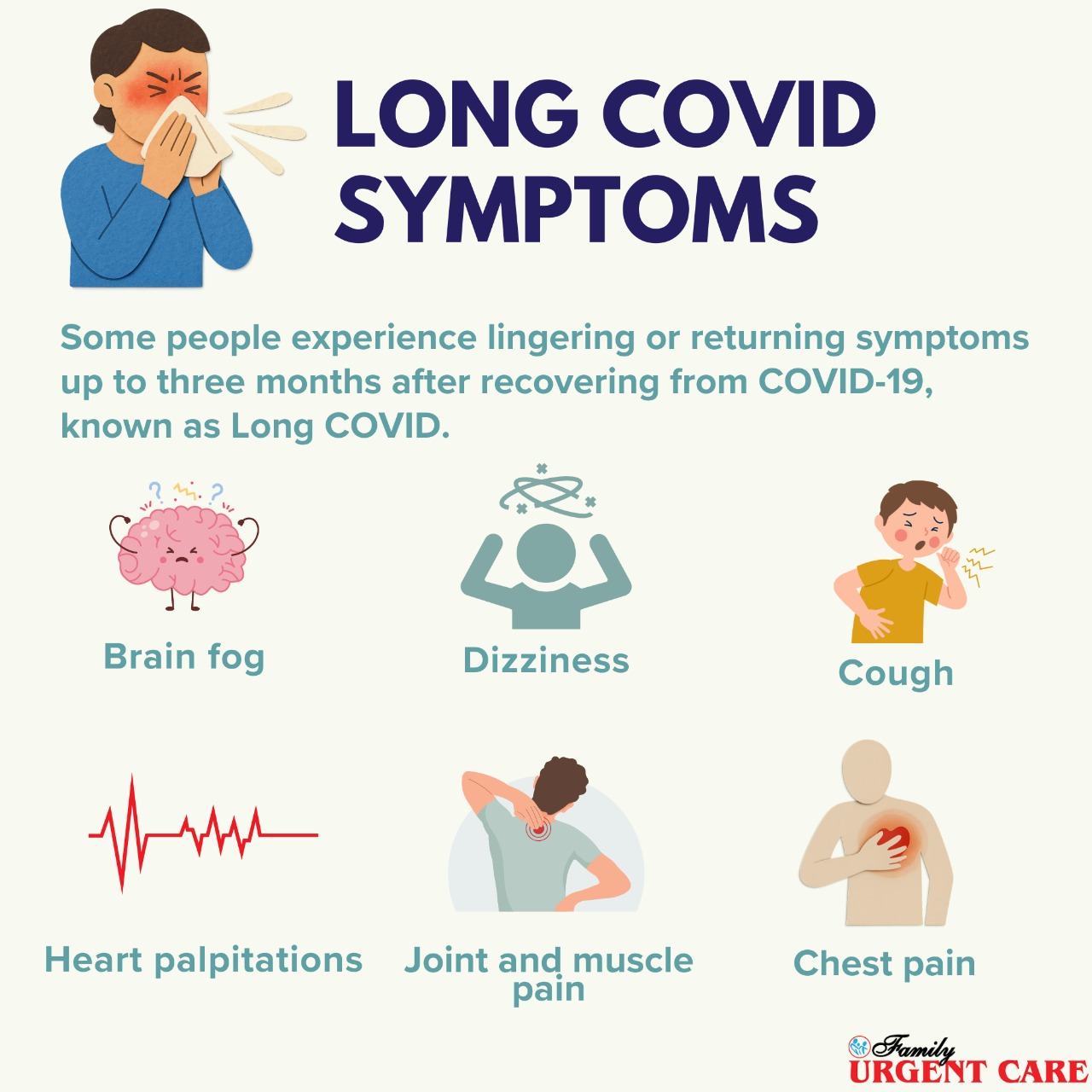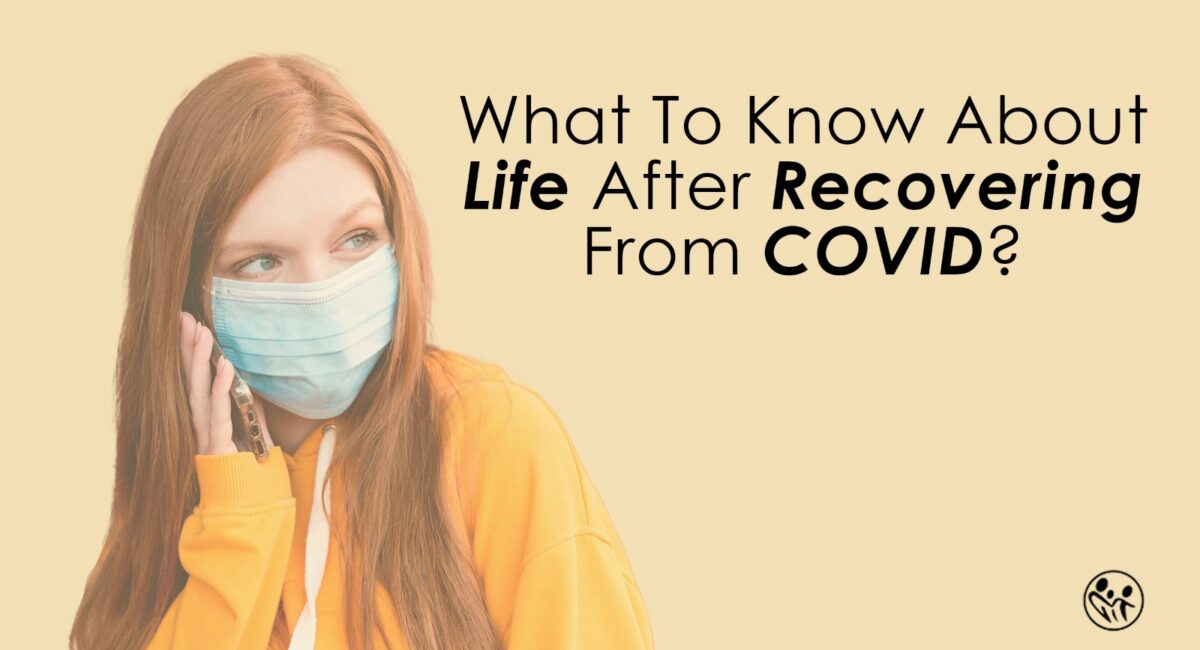You tested negative, finally! But even a week later, you still feel tired and foggy. It’s like your body clock and your brain didn’t get the memo that the virus has left the chat.
If that sounds familiar, you’re not alone.
We see it most of the time at our urgent care clinic: people who “recovered” from COVID but don’t quite feel back to normal yet.
The truth is, healing doesn’t stop when the test turns negative.
Your body’s still catching up, and that’s completely okay. Here’s what life after COVID really looks like (and how to help your body bounce back). But before we jump in, let’s learn about long COVID.
Read More: Can You Test Negative For Covid And Still Have It
Table of Contents
ToggleCould It Be Long COVID?
If you’re still feeling tired, foggy, or short of breath, experts name it Long COVID. It is a term for covid symptoms that hang around long after the virus is gone. It’s common, usually temporary, and just your body’s way of saying it needs a little more time to bounce back.

Why Do You Still Feel Tired After Recovering From COVID?
COVID takes more out of you than just a few sick days. Even after you’ve recovered, your energy could feel like it’s running on low power mode.
You might be back at work, doing laundry, making dinner, but halfway through the day, you hit a wall and think, “Why am I this tired?”
That’s your body’s way of saying, “Hey, I’m still healing here.”
What helps:
- Get back into your routine gradually and don’t push yourself too hard.
- Stay hydrated and eat balanced meals, as your immune system loves nutrients
- Take short walks to rebuild strength.
And if the fatigue sticks around for weeks or starts interfering with your day-to-day life, that’s your cue to check in.
We can run quick tests to ensure nothing else, such as low iron, thyroid issues, or post-viral inflammation, is slowing you down.
Why It’s Hard to Focus After Recovering From COVID (And What To Do About it)?
Once you’re back to work after COVID, you notice that you’re misplacing your keys or walking into rooms and thinking,” Wait! Why did I come here?”
That’s post-COVID brain fog, and it’s more common than you think. Your brain, just like the rest of your body, needs time to reset after fighting off a virus.
What helps clear the fog:
- Prioritize rest as our brain heals while you sleep.
- Dehydration can make fogginess worse, so make sure that you’re hydrated.
- Gentle exercise improves blood flow and focus.
- Too much screen time can drain mental energy fast, so make sure you’re giving your body enough rest.
If weeks go by and your concentration still feels off, stop by our urgent care. We can check your vitamin levels, thyroid function, or rule out anything else that might be adding to the fog.
Lingering Cough or Shortness of Breath After COVID? Here’s What to Know!
You’re finally past the fever and body aches, but that pesky cough still shows up at the worst times: mid-meeting, in church, or right when you’re trying to fall asleep.
Totally normal, but also worth keeping an eye on.
After COVID, your lungs might still be healing from inflammation. That means a little tightness, a mild cough, or slower recovery after exertion can hang around for a bit.
What helps your lungs recover:
- Avoid smoking or secondhand smoke.
- Stay hydrated (it helps loosen mucus).
- Do gentle breathing exercises or short walks to rebuild stamina.
But here’s the key: if your breathing feels worse instead of better, or you experience chest pain or dizziness, that’s your cue to get checked.
Chest Pains or Palpitations After COVID? What You Should Know?
Even if your COVID case was mild, some people may notice their heart acting a little differently. Rapid heartbeat, occasional palpitations, or mild chest discomfort may occur as your body adjusts.
Why does it happen?
- COVID can cause temporary inflammation that affects the heart.
- Dehydration, fatigue, and stress can also make your heart feel “offbeat.”
What you can do:
- Start with gentle activity at first.
- Stay hydrated and maintain a balanced diet.
- Note when palpitations happen, how long they last, and what you were doing.
When to call 911 immediately:
- Severe or persistent chest pain
- Shortness of breath that worsens
- Dizziness or fainting
Remember, a little extra caution now can prevent bigger problems later.
You Might Feel Low Or Anxious After COVID
You beat COVID, but now you’re feeling anxious about getting sick again or starting your work.
Many people experience mood changes, stress, or even mild depression after recovering from COVID.
Your body’s been through a physical and emotional marathon, and your mind is catching up.
Here’s what helps:
- Take it slow. Don’t rush back into “normal” life as healing takes time.
- Move your body. Gentle exercise, walks, or stretching can lift your mood.
- Stay connected and talk to friends and family.
- Make sure to get rest, as a tired mind feels everything more intensely.
And if your anxiety, sadness, or fatigue starts feeling too heavy to handle alone, it’s better to get help from expert health providers.
When to Schedule a Post-COVID Checkup (and Why It’s Worth It)?
Even if you’re mostly back to normal, some post-COVID symptoms can hinder getting back into your routine.
- At our urgent care clinics, we often recommend a visit if:
- You’re still feeling unusually tired, foggy, or short of breath
- You’ve noticed a lingering cough or chest tightness
- You’re experiencing heart palpitations or anxiety that won’t quit
- You just want to confirm you’re fully in the clear
During your post-COVID visit, we can check your oxygen levels, run simple blood work, review your heart and lung function, and answer every “is this normal?” question that’s been bugging you.
The Bottom Line
Recovering from COVID can sometimes take a lot of time. Some days you’ll feel great, and others you might still need that extra nap (or two).
But the good news is that you’re not alone in this. Whether you’re dealing with fatigue, brain fog, or just want to confirm if you’re completely healthy, our team is here to help you get back to feeling like you again.
You can visit any of our convenient urgent care locations across Indiana and Illinois without an appointment.


